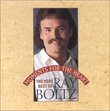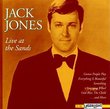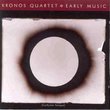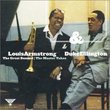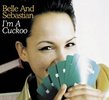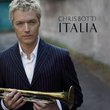| All Artists: Gil Shaham, Jian Wang Title: Brahms Violin Concerto in D major op 77 / Double Concerto A minor op 102 Members Wishing: 0 Total Copies: 0 Label: Deutsche Grammophon Release Date: 10/8/2002 Genre: Classical Style: Symphonies Number of Discs: 1 SwapaCD Credits: 1 UPC: 028946952924 |
Search - Gil Shaham, Jian Wang :: Brahms Violin Concerto in D major op 77 / Double Concerto A minor op 102
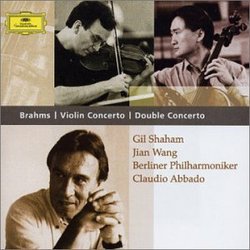 | Gil Shaham, Jian Wang Brahms Violin Concerto in D major op 77 / Double Concerto A minor op 102 Genre: Classical |
Larger Image |
CD DetailsSimilarly Requested CDs
|
CD ReviewsSpontaneous and inevitable Eric J. Matluck | Hackettstown, NJ United States | 12/19/2002 (5 out of 5 stars) "I ordered this disc from Amazon in the United Kingdom, a couple of months before it became available in the United States. I gave it a rave review on that Web site and feel compelled to repeat that review here:Thank God for the Internet! If not for it, Americans like me would hardly be able to lay hands on this extraordinary disc. And extraordinary it is, boasting superlative performances of two of Brahms' most important works in rich, velvety, and ideally balanced sound.The Double Concerto, long my favorite of Brahms' four concerti, here gets the performance of its life. Praise, first, to the two solists, who play as one; more than once during the first movement, where the violin begins a downward passage only to be taken up by the 'cello, or the 'cello begins an upward passage to be continued by the violin, I couldn't tell where one soloist left off and the other began. Such synergy is woefully rare in performances of this piece and here bespeaks (finally!) the matching of two musicians of caliber. Too often, we are forced to listen to a great violinist and a so-so 'cellist make this work into a violin concerto with 'cello obligato (I'm thinking of the unfortunate Mutter/Meneses/Karajan recording) or a great violinist and great 'cellist contort the piece out of all recognizable shape at the service of virtuosity (I won't even mention which recording I'm talking about here, because I know it has its legions of admirers). Instead, Shaham, Wang, and Abbado give a performance that is virile, yet touched by melancholy (the closing bars of the slow movement are breathtaking, as is much of the hushed development section of the first movement), and, by opening themselves up to a wider range of emotions than I've ever heard in this work, give it a fitting grandeur, appropriate to Brahms' valedictory orchestral statement.The performance of the Violin Concerto took me longer to get a handle on; it is emotionally complex (both the work and the artists' interpretation of it) and can't really be summed up in a few words. That said, the word that first came to mind was "sensuous," although there is no lack of heft in the reading here; then words like "spontaneous" and "effortless" came to mind. For a while there, truth to tell, I wondered if perhaps Shaham and Abbado didn't make the piece sound too "easy," not projecting enough sense of struggle, but then I realized that Brahms had conceived this piece as (what was for him) "idyllic." It shares the world of the Second Symphony and First Violin Sonata. After several more listenings I finally hit on the word "inevitable." Listening to the way the work is performed here, I can't imagine it being performed any other way. Yet there is nothing overtly radical about the interpretation. The first movement is alternately tough and tender, at a tempo a bit faster than the norm, but never (!) sounding rushed; the second movement has a wonderful whimsy (with a superbly individual delivery [lots of rubato!] of the famous oboe solo); and the finale goes like lightning without ever sounding like cheap display. Overriding it all is the superb partnership (and balancing) between solist and conductor, making this a true "symphonic concerto."In sum, a refreshing, thought-provoking, and altogether beautiful set of performances of two life-enhancing works, to engage mind and heart. I wouldn't be surprised if this one were destined for greatness." Good - and different modern recording laurie | Williamsburg, VA United States | 10/08/2002 (4 out of 5 stars) "This is the latest big name Brahms violin concerto recording- Hahn and Chung have both released recordings recently as well. I have reviewed the Hahn on amazon. This new recording from Shaham is a rather unusual modern recording for a couple of reasons. - It's quite fast, first of all. Heifetz fans should be pleased. The average first mvt these days goes around.. 22-24 minutes, but Shaham and Abbado take it in 20'50. Not 18'50, but the dramatic sections seem to speed up appropriately; the orchestral introduction is nearly exactly Heifetz/Reiner tempo. The second mvt is 8'30, the last a very sprightly 7'30. (compare to Heifetz 7'20 or... Chung 8'30). -It's a live recording; the balance is NOT forward on Shaham. This is not a problem in that you can hear very well the orchestra (one of my complaints about Hahn's recording was the forward balance), but Shaham's tone seems a bit more streamlined than it does in say, his Barber/Korngold recording, and sometimes it's hard to hear him. -The BPO is in top form(not that this is unusual for them, but it's so much more refreshing than some other orchestras, ie Academy of St Martin in the Fields), and Abbado is attentive to detail. All the lines are brought out and in general everything works together very well. As for Shaham's performance, perhaps because of the balance, it seems less colorful than you might expect. It also seems to be a relatively conservative reading in terms of emotional outpouring, etc. It's very clear, streamlined, technically perfect, refreshing - no whining in the upper registers - the giocoso is quick, the flourishes actually flourish, and there is humour as well. Is it beautiful?? Maybe, but those who prefer a Mutter approach (who probably aren't even considering this CD) will say no. I think it could do with a little more Heifetzian intensity myself. But in terms of sound quality and overall performance, I think it's a very good modern Brahms. (Gramophone gave it 5 stars in their August issue.) The double concerto I would not give 5 stars (but 4). Probably because there are less blah modern recordings of it than the violin concerto, so there's less out there to make it seem refreshing. There is nothing upsetting about the tempos (17'10, 8'00, 8'50), although for a minor point, the orchestral entrance in the first mvt (after the soloists present themselves) seems a little asleep. Abbado wakes up soon enough, though- I think it's the soloists who make or break this recording. Shaham and Wang are both very good, of course, but they lack that edge-of-your-seat intensity that Oistrakh/Rostropovich bring. They do not dig into the double stops as much as they could; it's almost like the easy listening Brahms double concerto. Maybe it'd work best for a younger fan who is still scared of nitty-gritty solo string playing? If I had to generalize nicely, I'd say it's a cooler, 'intellectual' reading. STILL, I have to recommend Oistrakh/Rostropovich/Szell as top choice for this concerto." In praise of a must-have Double Concerto Santa Fe Listener | Santa Fe, NM USA | 01/12/2006 (5 out of 5 stars) "This CD features a live performance of the Brahms Violin Concerto from 2000, followed a year later by a studio recording of the Double Concerto. Many here have praised Shaham's solo work, and I'd also rank his Brahms D major with the best modern recordings. I think Abbado's earlier 1992 reading on Philips with Viktoria Mullova, also live, finds both in stunning form, but this DG version, though not as brilliant sonically, is certainly fine. The first movement is now quite fast at 20 min.--only Heifetz and Reiner, in my experience, go faster. Shaham takes a delicate, inward view of this movement, playing with nuance for the microphone. The Adagio and finale are more standard but nevertheless quite sweet-toned and convincing.
But it's the Double Concerto, I think, that's the marvel. This late work reflects one of Brahms's unique emotions: melancholy fervor. Performances need to be spirited and fleet not to sound lugubrious. Here Shaham and cellist Jian Wang go further--they play with one voice, in a synchronized duet of amazing spontaneity and inner life. One marvels at how joyful this work can be made to sound, and Abbado is with them every step of the way. I've never heard the like. Five stars plus." |

